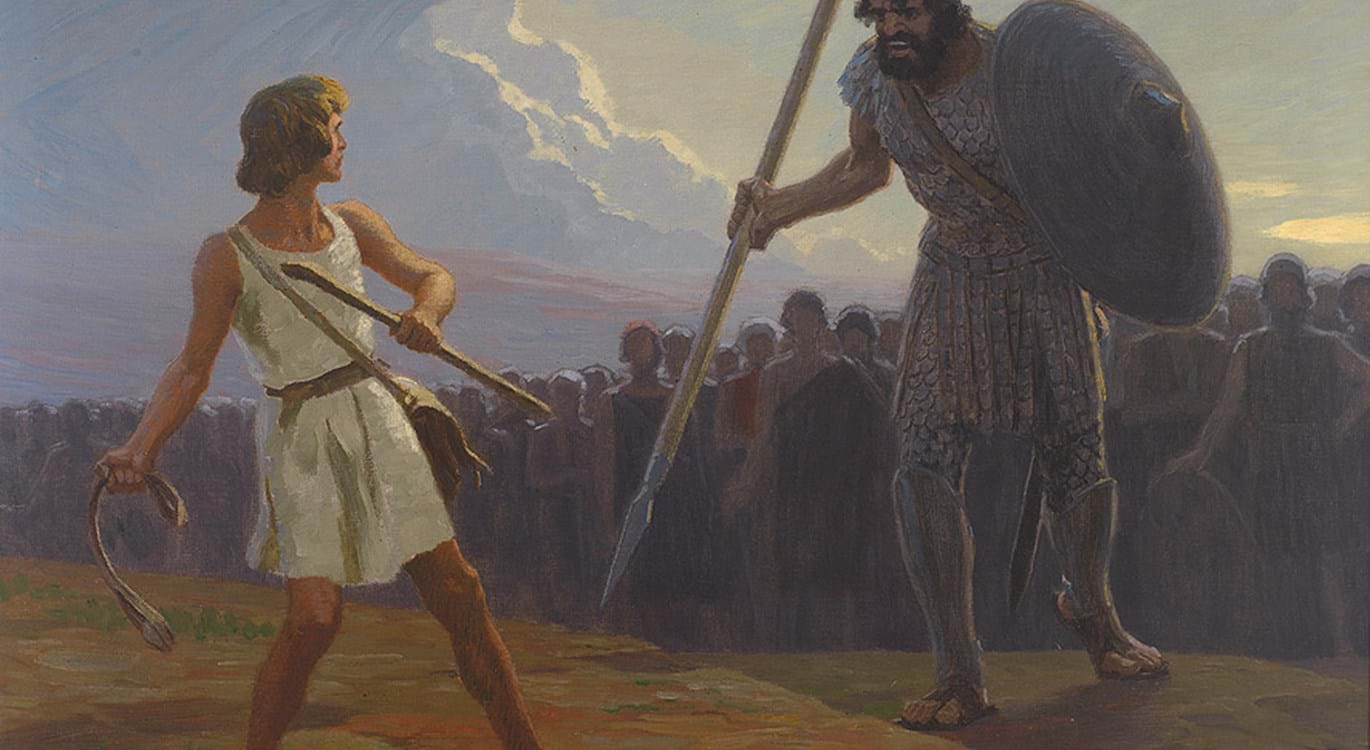Saul was the champion of Israel – head and shoulders taller than any other. He had had some success in battle, but this was different. This was Goliath. It seemed that Israel had no choice but to bow to Philistine oppression. There wasn’t any chance that Saul would take him on. Brave Abner was glad to keep his place at Saul’s side. Even faithful Jonathan seems missing in action. Into this hopeless situation, David, a shepherd boy, walks, bringing his brothers some lunch.
David recognized Goliath’s challenge was against God. David’s brothers could belittle him, Goliath could disdain him for his youth, and Saul’s armour could outsize him, but they all had the wrong perspective. They (Saul, Eliab) saw it as the little guy (David) up against the big guy (Goliath). David saw it as the little guy (Goliath) defying the armies of the living God! Therefore, David was unafraid, confident with his sling and stone, for with these God had delivered him from other hopeless situations involving bears and lions. The size of the oppressor always pales in comparison to the God of heaven. David wasn’t into slaying giants, he was into honouring God.
You would think that Saul would have been pleased with David’s achievement. That he would have been impressed with his faith in God. But Goliath was really just a caricature of Saul. He was everything Saul was, everything he aspired to be – just supersized. Bigger and stronger. Saul was paralyzed when he met the one who outsized him and was happy to pass the responsibility of confrontation on to another. However, when he saw how quickly David overcame Goliath, he was immediately jealous and concerned that he might be David’s next target. If David could take down Goliath, surely he could take down Saul. David’s interactions with Goliath resulted in years of sorrow and hardship at the hand of Saul. Yet David never took Saul down. Why? Because Saul was the Lord’s anointed. David wouldn’t defy what God had done. He would wait for Saul to fall on his own sword.
What lessons can be learned? We love to imagine ourselves as young Davids slaying the giants of our lives, but are we willing to learn God caring for sheep? David didn’t brashly enter the field of battle. He knew what it was to spend sleepless nights alone caring for sheep, risking his life in dependance on God for the well-being of his flock. This lesson is the obvious one, but perhaps the one noticed less often is what David experienced at the hand of Saul. We are often blindsided when our achievements are not appreciated. David’s victory was to be a blessing for all, but he quickly became the target of the one who benefitted most from it (i.e., Saul). The reliance on God needed to win the battle with the giants pales in significance to the faith required to sustain the war that ensues when those who should appreciate victories over the flesh scramble to maintain their position and power from the perceived threat. Jesus had the same experiences. He would heal the sick, forgive sins, feed thousands and the religious elite still found fault. David took on Goliath to rescue Israel from the Philistines, yet later found refuge amongst the Philistines when Israel was bent on capturing him.
So why confront when it seems like it will only invite more conflict? When life will only get more difficult? Because we are called to act justly (Micah 6:8). We have a responsibility to look out for the disadvantaged. The righteous will deny and disadvantage themselves for the benefit of the oppressed. Unfortunately, the greatest opposition is often from those who should be supporting us in the conflict, and these opponents are more difficult to deal with than the initial issue. Sadly, they are often our own brothers and sisters (like David’s brother Eliab and the brothers of the Lord) and leaders (like Saul and the Pharisees). But if there is one thing we should have learned by now in this study of confrontations, the obligation to confront in the interest of righteousness is independent of the outcomes. So, we trust in God and take up His Word knowing that in that Day it is to Him that we will give account.
“In the world you will have tribulation. But take heart; I have overcome the world” (John 16:33).



